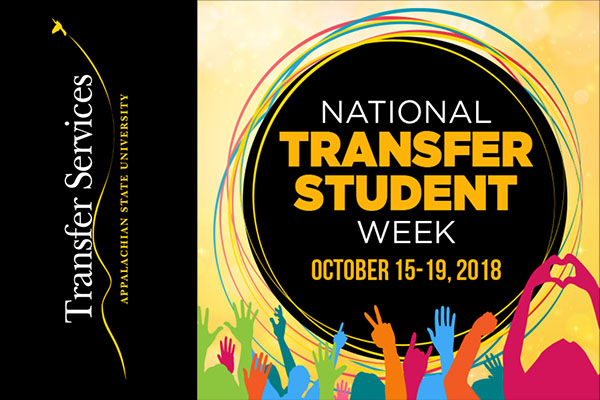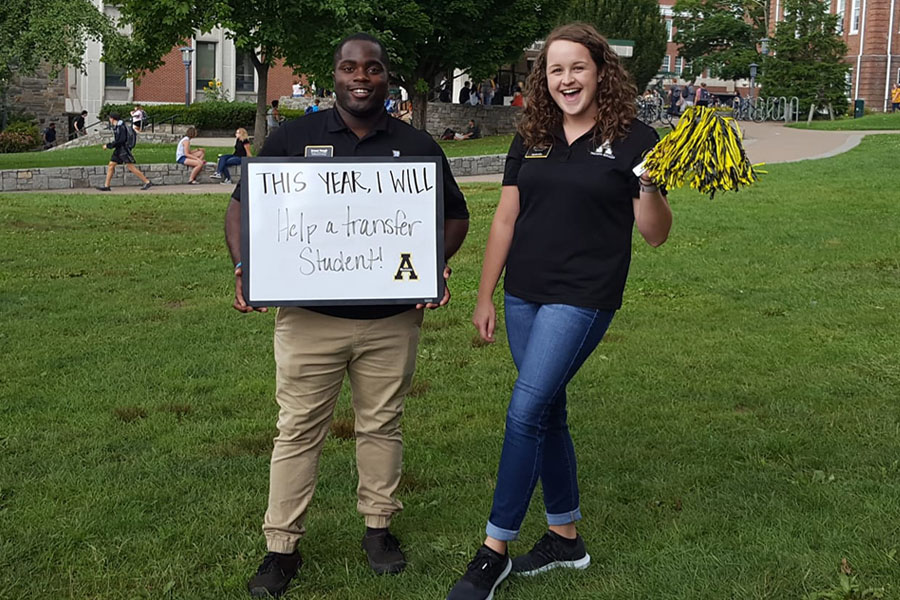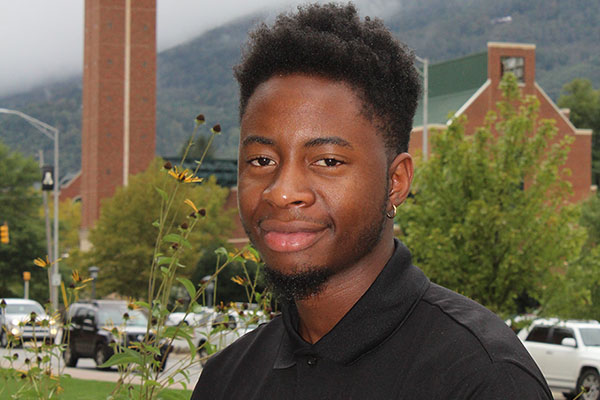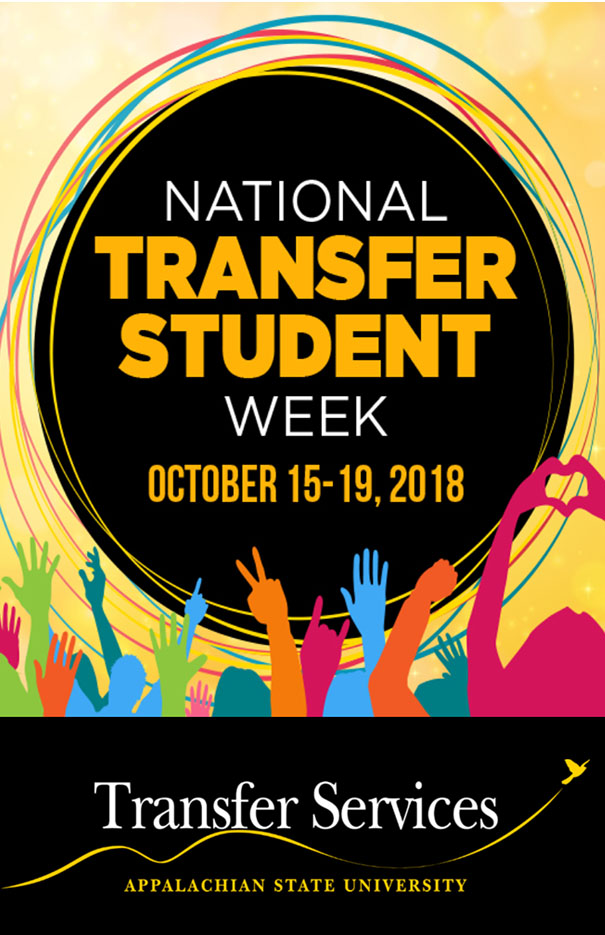BOONE, N.C. — One-third of undergraduate students at Appalachian State University enter the university as transfers from another institution. Whether they come from a community college, another four-year university or the military, Appalachian is nationally recognized for giving these students a warm welcome.
Accolades for Appalachian’s attention and seamless transition offered transfer students include the following:
- Inclusion, for the second year in a row, in Phi Theta Kappa’s 2018 Transfer Honor Roll, which recognizes excellence in community college transfer pathways.
- Inclusion in the top 7 percent of U.S. colleges and universities in 2019 for nontraditional students, which include transfer students, according to College Factual.
- A reputation as a national model for how universities can create a climate that helps transfer students succeed. Staff in the Office of Transfer Services frequently present at national and international conferences and host staff from other universities who visit Appalachian’s campus to see transfer services first-hand.
This fall, 1,278 transfer students are enrolled at Appalachian. Each spring, another 400–500 students typically transfer in.
According to the Office of Transfer Services, seven out of 10 new transfer students come from a community college.
“Our strong transfer student numbers are due in large part to the intentional work we do with community colleges,” Chancellor Sheri Everts said. “As co-chair of the Higher Education Task Force for My Future NC, a statewide commission on educational attainment, I am working with education professionals across the state to address issues of increasing access to education — and decreasing achievement gaps. As part of this work, the commission is addressing transfer pathways from community colleges to four-year institutions.”
Most recently, Everts and Provost and Executive Vice Chancellor Darrell Kruger have been working with Caldwell Community College and Technical Institute to develop programmatic collaborations and co-admission and co-enrollment agreements that will enable a more seamless transition of students between Caldwell and Appalachian.
Jane Rex, director of the Office of Transfer Services, said she is proud of the university’s support of students seeking transfer to Appalachian — including the creation in 2010 of the office she directs.
“Organizationally, Appalachian is distinctive in its service to students who transfer because all services are under one roof. This makes it much easier for students,” she said. “But, we’re also strong as an institution — not just for transfers — which goes to show how supportive we are as a community.”
Reasons for transferring vary. Some students start at a community college for convenience, to save money or to have time to mature, while others may have left a previous university for their choice of major or a personal reason, Rex said. More than 100 of this year’s transfer students are military affiliated, and 174 come from “early colleges,” where they could complete their associate degree at the same time as their high school diploma, she said.
Students who transfer to Appalachian succeed
Appalachian has a first- to second-year retention rate for all transfer students of 86 percent and a four-year graduation rate of 70 percent, according to the Office of Transfer Services.
Retention and graduation rates of transfer students are not tracked nationally, but a 2017 survey by the National Center for Education Statistics showed transfer students generally perform better than their peers, especially at public colleges and universities.
Additionally, the completion rate for Appalachian’s graduating students who transferred after graduating from N.C. Community Colleges is more than 20 percent above the national average, said Dr. Kim Morton, associate director in the Office of Transfer Services. These figures are based on information from the Community College Research Center.
Other facts about transfer students at Appalachian:
- 40 percent of them are first-generation college students.
- 17 percent represent diverse populations.
- 73 percent live off campus.
A national model for success among transfer students
A number of programs have made Appalachian’s Office of Transfer Services nationally recognized:
Admissions:
- Jump Start Appalachian — a transition and support program for partner community colleges that helps students before, during and after transfer.
- Transfer Student Mentors — student mentors who have successfully transferred to Appalachian and are available to help prospective, admitted and new transfer students during the transition to Appalachian.
- Faculty Transfer Mentors — more than 90 professors interested in developing supportive, academic relationships with prospective and new Appalachian transfer students.
- Transfer Track — a transfer-specific campus visit with an admissions presentation and campus tour.
- Transfer Pre-Orientation Program (T-POP) — a program designed to provide additional support and resources to transfer stundets prior to orientation.
- Admitted Student Webinars provide students an opportunity to learn next steps and understand how their credits transfer.
Campus Life:
- Residential Learning Communities, where transfer students live and study together — one for transfer students in general and another for transfers preparing to be educators.
- Transfer student programming — intentional social events to help students integrate to campus.
- Tau Sigma Transfer Honor Society — a national honor society for transfer students.
- Transfer Student Organization, offering bowling and board games to hikes and ice cream socials for transfer students.
- Transfer Symposiums — events held on campus that raise awareness of transfer students, their needs and topics related to student success.
About Transfer Admissions and Engagement
Transfer Admissions and Engagement at Appalachian State University supports students through all stages of their transfer journey, including admission counseling and pretransfer advising, credit evaluation, transitional assistance as they begin at App State and through involvement and retention efforts during their App State education. The office serves undergraduate transfer students studying on the main campus in Boone as well as App State Online students who complete their classes fully online or at an off-site location. The services and resources provided by Transfer Admissions and Engagement ensure the university’s transfer student population finds academic and social success at App State. Learn more at https://transfer.appstate.edu.
About Appalachian State University
As a premier public institution, Appalachian State University prepares students to lead purposeful lives. App State is one of 17 campuses in the University of North Carolina System, with a national reputation for innovative teaching and opening access to a high-quality, cost-effective education. The university enrolls more than 21,000 students, has a low student-to-faculty ratio and offers more than 150 undergraduate and 80 graduate majors at its Boone and Hickory campuses and through App State Online. Learn more at https://www.appstate.edu.
What do you think?
Share your feedback on this story.

















